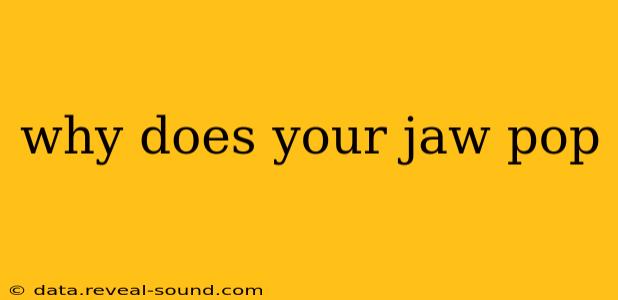A popping jaw can be a frustrating and sometimes painful experience. Understanding the underlying causes is crucial for effective management and treatment. This comprehensive guide explores the reasons behind jaw popping, offering insights into the temporomandibular joint (TMJ) and its potential problems.
What is the Temporomandibular Joint (TMJ)?
Before diving into the reasons for jaw popping, let's understand the TMJ itself. The TMJ is the joint connecting your lower jaw (mandible) to your skull. It's a complex joint, responsible for crucial functions like chewing, speaking, and yawning. Its intricate design allows for a wide range of motion, but this complexity also makes it susceptible to various disorders.
Why Does My Jaw Pop? Common Causes
The most frequent reason for a popping jaw is a temporomandibular joint disorder (TMJD). TMJD encompasses a range of conditions affecting the TMJ and the muscles controlling jaw movement. Here are some of the common culprits:
1. Disc Displacement:
The TMJ contains a disc of cartilage that acts as a cushion between the jawbone and the skull. When this disc becomes misaligned or displaced, it can cause a popping or clicking sound as the jaw moves. This is often the primary reason for a jaw that pops. Sometimes, the disc can even become trapped, leading to locking of the jaw.
2. Ligament Issues:
The TMJ is supported by a network of ligaments. Damage or stretching of these ligaments can cause instability in the joint, leading to popping sounds. This can be due to trauma, overuse, or underlying conditions.
3. Arthritis:
Both osteoarthritis (wear and tear) and rheumatoid arthritis (an autoimmune disease) can affect the TMJ, causing inflammation, pain, and popping. The inflammation can lead to changes in the joint's structure, contributing to the clicking or popping sensation.
4. Muscle Spasm:
Overuse or stress can cause the muscles controlling jaw movement to spasm. This can lead to both jaw pain and popping sounds. Grinding your teeth (bruxism) is a common contributor to muscle spasms.
What if My Jaw Pops and is Painful?
If your jaw popping is accompanied by pain, limited movement, or swelling, it's crucial to seek professional medical advice. Ignoring the symptoms can lead to more severe complications. A healthcare professional can diagnose the underlying cause and recommend appropriate treatment options.
How is Jaw Popping Diagnosed?
A doctor or dentist specializing in TMJ disorders will typically conduct a physical examination of your jaw and assess your range of motion. They may also use imaging techniques like X-rays or MRI scans to visualize the joint and identify any abnormalities.
What are the Treatment Options for a Popping Jaw?
Treatment options for a popping jaw depend on the underlying cause and the severity of symptoms. These may include:
- Conservative Management: This includes self-care measures such as applying ice, taking over-the-counter pain relievers, and avoiding activities that aggravate the symptoms.
- Physical Therapy: Targeted exercises can help strengthen the jaw muscles and improve joint mobility.
- Splints or Mouthguards: These devices can help reposition the jaw and protect the TMJ from further damage.
- Medications: In some cases, medications may be prescribed to manage pain and inflammation.
- Surgery: Surgery is usually considered as a last resort for severe cases that don't respond to conservative treatment.
Can I Prevent My Jaw From Popping?
While not all cases of jaw popping are preventable, adopting healthy habits can significantly reduce the risk. These include:
- Maintaining good posture: Poor posture can strain the TMJ.
- Managing stress: Stress can exacerbate TMJD symptoms.
- Avoiding excessive jaw movements: This includes things like chewing gum excessively or biting your nails.
- Practicing proper oral hygiene: This prevents dental problems that can contribute to TMJD.
- Treating bruxism: If you grind your teeth, using a mouthguard at night can help protect your TMJ.
Remember, this information is for general knowledge and shouldn't replace professional medical advice. If you're experiencing jaw popping or pain, consult a healthcare professional for a proper diagnosis and treatment plan.
